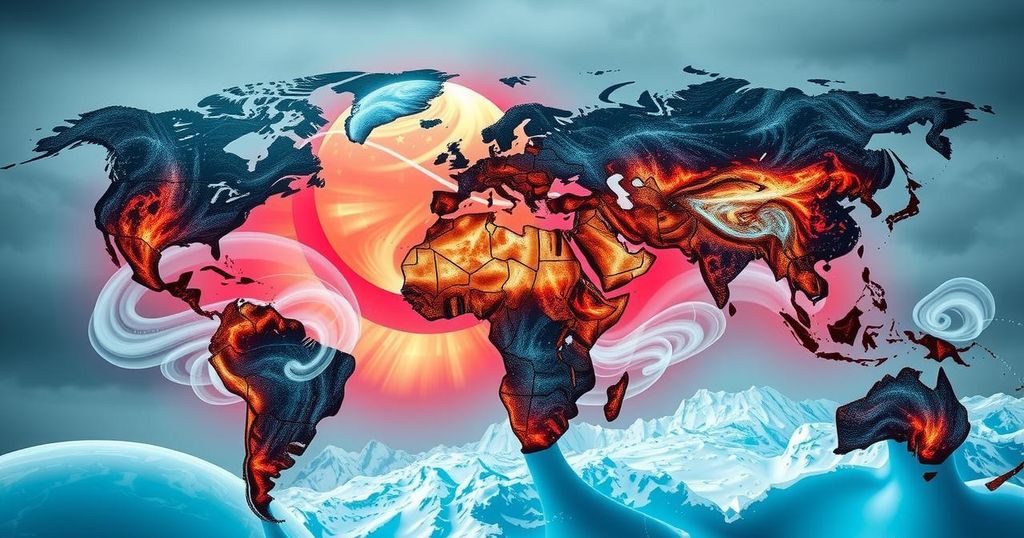The year 2024 is anticipated to be the hottest on record, fueled by human-induced greenhouse gas emissions. The World Meteorological Organization warns of unprecedented climate impacts, prompting global calls for significant action to reduce emissions and adapt to the changing environment. Key leaders highlight the urgency in tackling climate change as extreme weather events continue to escalate, affecting lives and economies worldwide.
The year 2024 is poised to be recorded as the hottest year in history, encapsulating a decade characterized by extreme heat largely driven by human actions, according to the World Meteorological Organization (WMO). Greenhouse gas concentrations have reached unprecedented levels, contributing to further warming. UN Secretary-General António Guterres stated that we are currently experiencing a “decade of deadly heat,” emphasizing the urgent need for countries to reduce emissions dramatically.
In January, the WMO will release the global temperature data for 2024, followed by its comprehensive State of the Global Climate report scheduled for March 2025. Secretary-General Celeste Saulo reiterated the critical situation, marking the urgency of the climate crisis and underscoring the shared global responsibility to mitigate its impacts. She noted that even slight increases in temperature significantly aggravate climate extremes and risks.
This year witnessed numerous catastrophic events worldwide, including record rainfall and flooding, exceptionally intense tropical cyclones, and unprecedented heat waves reaching above 50 °C. The aftermath caused immense human suffering and economic damage, prompting calls for immediate action. The WMO’s Early Warnings for All initiative aims to enhance climate adaptation, while its Global Greenhouse Gas Watch initiative targets emissions reductions.
Looking ahead, 2025 will focus on glacier preservation as part of the International Year facilitated by UNESCO and WMO. This emphasis on the cryosphere highlights the ongoing changes prompted by climate change, rapidly affecting sustainable development. Furthermore, the World Weather Attribution analysis revealed that climate change exacerbated numerous deadly weather events in 2024, indicating a dire need for cooperative international efforts against extreme heat risks.
A recent forum convened by WMO brought together experts from various sectors to strategize against extreme heat, in line with the UN Secretary-General’s Call to Action. The WMO’s ongoing initiatives forge a collaborative pathway for safeguarding public health while facilitating climate monitoring and adaptation measures on a global scale.
The article discusses the alarming trends of climate change observed in the year 2024, reported by the World Meteorological Organization (WMO). With record-high temperatures, the data reflects a troubling increase in extreme weather events and extreme heat occurrences, attributed to human activities. The urgency expressed by key figures such as UN Secretary-General António Guterres and WMO Secretary-General Celeste Saulo emphasizes the need for immediate action to mitigate climate change impacts through emission reductions and effective climate services. 2024 serves as a pivotal year in understanding the accelerating climate emergency, with various international initiatives aimed at adaptation and mitigation strategies.
In conclusion, 2024 marks a critical juncture in the climate crisis, projected to be the hottest year on record, signaling the urgent need for global action. The ongoing increases in greenhouse gas levels and the resulting extreme weather phenomena emphasize the immediate requirement for concerted efforts in emission reduction and climate adaptation. As the WMO and its partners prepare to address these challenges, collective responsibility and rapid response are essential to secure a safer future for the planet.
Original Source: wmo.int






